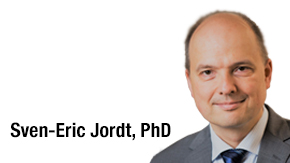- Your full title as you’d like it to appear.
Associate Professor of Anesthesiology, Pharmacology and Cancer Biology at Duke University School of Medicine
- Three statements about you – two true, one false.
-
- A Nobel Laureate fell asleep during my presentation.
- Everyone interviewing for a position in my lab has to sample a range of increasingly painful hot sauces.
- The first department chair I worked under wore solid 24k gold buttons on his whitecoat.
- Give us your ‘elevator pitch’ biography.
I am a biochemist and ion channel physiologist by training and developed a fascination for lung physiology early in my graduate research. I then took a detour, exploring pain pharmacology and neurobiology and chemosensory mechanisms as a postdoc at UCSF, including receptors for hot spices. After starting my independent lab at Yale, later moving to Duke, I connected these two fields, leading to breakthrough discoveries of receptors for environmental irritants threatening lung health in asthma, acute lung injury, and in smokers and users of electronic cigarettes. Our research is informing regulatory policies of FDA and international regulators. Thanks to ATS, I find myself becoming more and more involved in lung health advocacy and education.
- What would you tell yourself as an Early Career Professional?
Let the science guide you! Don’t let your field of research box you in. Do not respect boundaries. Read voraciously. Train to become a skilled and productive writer. Acquire the techniques you need to reach your scientific goals. Try crazy things; they sometimes will show the way to new solutions and scientific findings. Approach the coolest faculty in your department to be your mentors. Talk to clinicians about their clinical challenges. Be an interdisciplinarian.
- If you weren’t in medicine, and were in a different industry altogether, what would you be?
Sailor. Computer Scientist. Tweeter. Personal shopper.
- What is your favorite way to spend a day off?
Hiking in the North Carolina mountains. Bodyboarding with the kids at the beach. Baking rolls.
- What areas of medicine are you most excited to see develop?
I am excited about new technologies enabling us to investigate lung-brain interactions. Respiratory health has a great impact on other organ systems, including the brain, impacting brain and mental health.
- What is one advancement in your field you’d like to see in your career?
As a scientist studying the health effects of toxic and pain-inducing chemicals in the lung, I’d like to see the U.S. government ban tear gas agents. It is inconceivable that these unregulated chemical weapons are used so widely and indiscriminately.
The FDA needs to ban menthol in tobacco products that victimizes African Americans and other minority smokers, locking them into co-dependence on nicotine and menthol.
I’d like to see more investment in cough research and therapeutics. Cough, and especially chronic cough, is an unmet clinical need and is often misunderstood as a symptom, and not as a disease that often becomes uncoupled from its original cause. I believe that progress in pain research will inform cough research, since pain-sensing and cough-inducing nerves are very similar.
- Ok. Which statement did you make up?
The hot sauce test was abandoned. And, yes, the Nobel Laureate looked like he fell asleep during my talk. But in the end, he woke up and asked the most informed questions. His students told me he only “appeared” to be sleeping.

